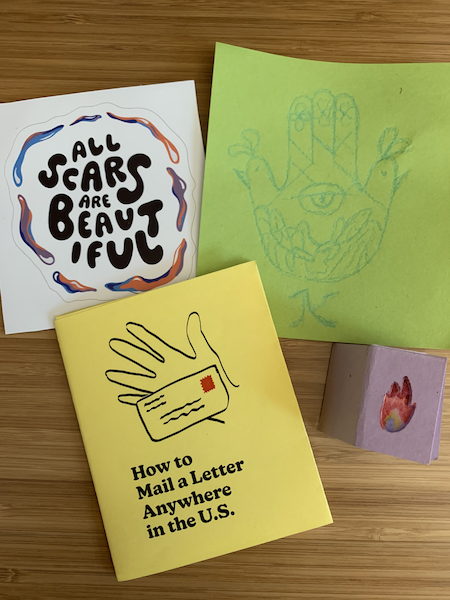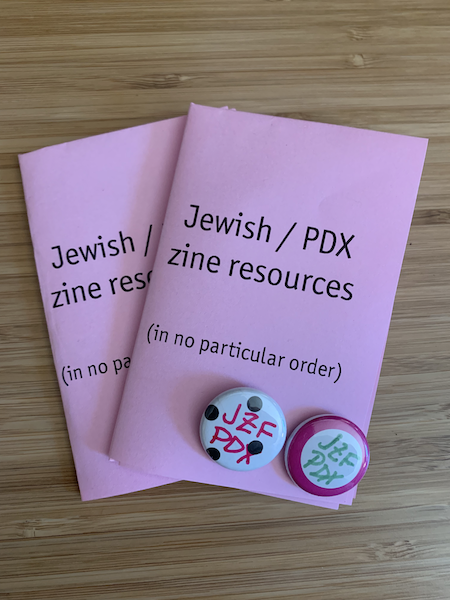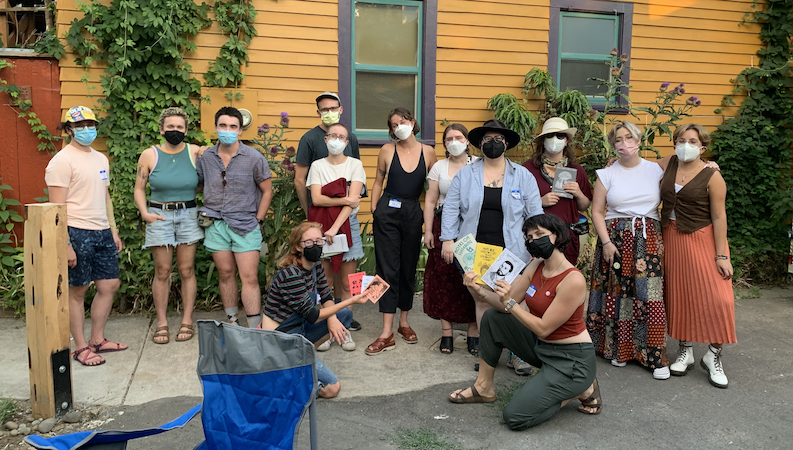I enjoy making zines. I especially enjoy making zines about Jewish topics. When I saw that the Jewish Zine Archive was planning to hold a Jewish Zine Fest, I obviously got excited. I got so excited, in fact, that I signed up to host a pop-up event in Portland.
Since this event is my first time hosting an in-person event since the beginning of the pandemic, I figured I’d write up my experiences, along with what I’d do differently if I were immediately running another similar event.

Timeline
I signed up to host a little late, on July 12. As a result, I had 30 days to get everything set up. As a result, I wanted to keep things as simple as possible: I figured just getting a chance to hang out, share zines, and maybe make a few new zines would be both fun and manageable, provided I could get the right location.
Location
Books with Pictures, at 1401 SE Division Street, was my first choice. The store is one of my favorite places in Portland, not just one of my favorite comic shops. As it happens, the Eisner Awards agree with me and named Books with Pictures the best comic shop in the world while I was prepping for this event.
As far as event planning goes, Books with Pictures has a lot going for it:
- an inclusive vibe that makes most people feel comfortable
- good COVID-19 safety practices, including requiring masks within the shop
- an outdoor garden space, along with a food cart pod and eating area
- a space I’ve already seen folks navigate with a variety of mobility devices
- a willingness to experiment with different kinds of events (Books with Pictures’ mini-con in early July was a key inspiration)
Books with Pictures also stocks zines, so I figured the location would be a good opportunity for zine makers to connect with a stockist, if that was something any attendees wanted to do. People could also pick up more zines without anyone needing to schlep along a bunch of projects. Luckily, the garden was available for this event!
I received a few comments from attendees on the decision to use a space that isn’t explicitly Jewish (like a synagogue or a Jewish community center). The comments were positive and I think they are emblematic of a larger discussion of changes happening within Judaism right now. We need more great Jewish events and spaces that are outside of institutional Judaism.
I already had Books in Pictures in mind when I agreed to organize a pop-up, in part because I personally value being Jewish outside of buildings set aside for that purpose. I also chose Books with Pictures because I wanted a space that not only has an existing connection to zine communities, but also because zines are about accessibility and often appeal to communities that have been othered. Books with Pictures’ whole shtick is creating inviting spaces for folks who have been othered by the standing comics community.
I was also aware from the get-go that some of the discussions I hoped to have at the pop-up wouldn’t be the best fit for most of the Jewish institutions around Portland. Like many other Jewish institutions, a lot of Portland’s synagogues and other Jewish organizations are committed to Israel and Zionism. Even mentioning Israeli nationalism or oppression of Palestinians is off the table in those sorts of spaces. That’s a problem, especially for me since some of my own Jewish zines focus on dismantling nationalism. So I wanted a space that allowed for discussions that just wouldn’t happen in more official Jewish spaces.
Access efforts
I prioritize making events as accessible as possible. For this event, my biggest concerns were
- ensuring COVID-safety for attendees who are high risk, including immunocompromised folks
- keeping the costs of attending as low as possible
- guaranteeing access for folks using mobility aids, because outdoor spaces can be harder to navigate
Of course, providing access in one way can limit other kinds of accessibility. I know that there are probably people who didn’t feel they could participate in an outside event — there’s no way to control factors ranging from outside allergens to high levels of sensory input. However, I feel that focusing on the aspects of access listed above ensured as many people as possible would be comfortable at the event.
I described access efforts in the event landing page, as well as when discussing the event. I also included contact information for folks who needed access options beyond what I initially set up.
COVID safety
Many people are acting as if the pandemic is over. Personally, I’m only going to events that are masked and either outside or in well-ventilated spaces. Obviously, any event I organize needs to at least meet my personal standards.
Attendees were required to wear masks at the event, which was outside. Working with Books with Pictures was easy, as the store requires shoppers to wear masks and advocate for mask use even at their outside events. They’ve held a bunch of events in their outside spaces, including their garden and on the sidewalks around the business, so they’ve got practice with the steps necessary to make outdoor spaces accessible (like making sure folks can get to the indoor bathrooms without too much hassle). That made ensuring mobility access much easier for me.
All attendees wore masks and no one shared any complaints. All I needed to do was set out spare masks where folks could grab them, and remind a few folks to mask up as they arrived. While I didn’t specifically ask attendees their thoughts, I do know at least a few folks came who are even more cautious than I am. That makes me feel like I hit my goals. From what other event organizers have shared on social media, I think a lot of people are willing to mask up, provided they’re asked to do so.
Financial access
Zine events are typically inexpensive to participate in. Zine culture revolves around making and sharing work that costs a fraction of the cost of professionally produced work. But even a free event can cost money to participate in — expenses like transportation to get to and from a location or copying zines to swap can make some folks feel like they can’t participate.
With that in mind, I decided to offer a few stipends of $25, structured to be as low-effort as possible (both for me and for folks requesting the stipend). The application was a form asking for name, contact information, and payment options. I limited the payment options to methods that were easy on me (Venmo, CashApp, or cash at the event).
One person requested a stipend and I was able to provide them with funds before the event. In my experience, small stipends make a big difference to the folks who request them. I’ve had minimal issues with requests from people who may not actually need stipends, though that may be due to the relatively low dollar amount of this sort of stipend.
Physical safety
I’ve done enough work enforcing community codes of conduct that I plan for worst case scenarios for even the smallest of events. I tweaked the code of conduct template I use for meetups. One tweak I prioritized was ensuring that I’d be able to address anyone responding to support for Palestinians with accusations of anti-Jewish bias.
Speaking of anti-Jewish bias, one of my concerns about running this event is the growing bias and violence against Jews in this country. I didn’t think that a zine meetup presented a huge risk, but I wanted to make sure to mitigate that risk as much as I could. I reviewed social media thoroughly for potential issues (including checking up on prospective attendees) and planned for contingencies.
In the end, we had no reported problems with attendees’ conduct or problems from outside sources.
Supplies
Even though I haven’t been running events lately, I still maintain a stash of certain supplies. I found three separate containers of name tags when I was preparing. I also have a fair amount of zine-making supplies on hand at any time. However, I did make a trip to Scrap in order to bulk up my supplies — and also to have a good excuse for visiting Scrap. I got a wealth of different kinds of paper (including two full reams of printer paper, one pink and one green) and didn’t break the $20 mark.
I did make some swag for the event — I haven’t had an excuse to pull out my button maker in a minute, so I had to make pins! I also made a mini-zine of relevant resources, as well as a short version of the event’s land acknowledgement and code of conduct. Of course, I printed the minizine on some of the pink paper I scored at Scrap. Here’s the mini-zine, if you’d like to check it out!

Here’s what I took with to the event in terms of supplies:
- Event logistics: Name tags, sharpies, extra masks, extra phone chargers, and a spare battery
- Zine-making supplies: A variety of types of paper, scissors, stapler, glue, stickers, colored pencils, crayons
- Swag: Pins and mini-zines
- My own zines to swap and share (as well as a few zines in my collection I wanted to show off)
All told, I spent under $50 to run the event. Of course, someone without a stash of event supplies or with more stipend requests might need to spend a bit more to run an equivalent event.
Outcomes
The Portland Jewish Zine Pop-Up was a resounding success. I was expecting a turnout of perhaps 15 people, but we had more than 35 attendees! I think everyone had a good time and got to engage in a way that worked for them.

A few highlights that really excited me:
- A kid made their first ever zine!
- Three people came from Seattle!
- Eight people have asked me when the next Jewish zine meetup is!
Interestingly, only a handful of attendees were also going to the Jewish Zine Fest — the rest of the attendees were just present to hang out with other folks interested in Jewish zines.
Future improvements
I haven’t yet decided on whether to host a second Jewish zine pop-up, despite the requests to do so. If I were to do another one, I definitely want at least one co-organizer! I’m pretty sure that this event was relatively easy to run because of my excitement — a follow up event may be a little harder to put together.
But I am already thinking about what I might change for a follow-up event. Here are a few of the things I’m thinking about:
- Signage — I somehow forgot all about signage during my prep work. Putting up some signs to suggest people wear name tags or direct folks to the restroom is just good sense.
- Land acknowledgement — I always feel awkward about land acknowledgements. They’re important, but since I’m not Indigenous, I worry about getting land acknowledgements right. Jewish spaces add an extra layer of complication and I want to do more research and think more about how to improve on the land acknowledgement I offered.
- Cold weather space options — Books with Pictures’ garden is an amazing space, but it will likely be a little less perfect during winter months.